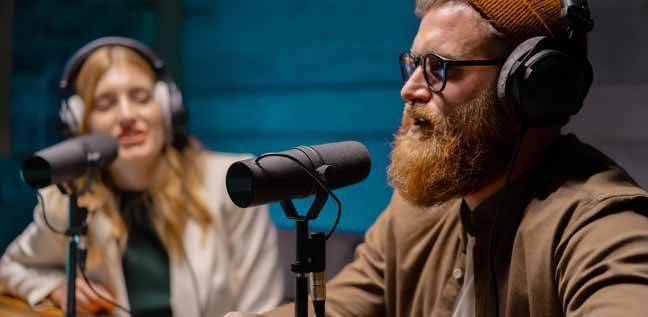Podcast Lawyer NYC - Francelina M. Perdomo Klukosky of Perdomo Law

Podcast Industry Law Firm, Perdomo Law in Manhattan New York, NY
Podcasts have become extremely popular in the U.S. in recent years, with millions of people regularly tuning in. Approximately half of the American population has listened to at least one podcast, and a substantial number continue to do so monthly. This surge in popularity can be attributed to the wide variety of content available, ranging from true crime and comedy to health and education, which appeals to diverse audiences. The format's flexibility allows listeners to consume content while commuting, exercising, or multitasking, making it a convenient choice in today's fast-paced world.
Younger demographics, particularly Millennials and Gen Z, have shown a strong preference for audio content, often choosing podcasts over traditional media. Additionally, the growth of smartphone usage has made it easier for people to access their favorite shows, contributing to the medium's rise. As brands increasingly invest in podcast advertising and sponsorships, it's clear that podcasts are not just a passing trend; they are establishing themselves as a significant force in the media landscape, with the potential for continued growth in the coming years.

Podcast Legal Risks Associated without Legal Guidance
Without legal guidance, a podcast host may face several risks that could undermine their show's integrity and expose them to potential legal issues. One of the primary concerns is copyright infringement. Hosts might unintentionally use copyrighted music, sound clips, or content without proper permissions, leading to takedown notices or legal action from copyright holders. Additionally, podcasters could inadvertently defame individuals or businesses by making disparaging remarks, which might result in lawsuits.
Another risk involves failing to comply with advertising and sponsorship regulations, particularly concerning disclosures and endorsements, which can attract scrutiny from regulatory bodies like the Federal Trade Commission (FTC). Privacy issues are also significant; if a host shares personal information about guests or listeners without consent, it could lead to breaches of privacy laws and lawsuits.
Furthermore, inadequate agreements with collaborators or guests can result in misunderstandings about ownership of content and intellectual property rights, potentially causing disputes down the line.
Lastly, without legal oversight, hosts may not be fully aware of the complex landscape of podcasting regulations, such as those regarding licensing and distribution rights, which could affect their ability to monetize the podcast effectively. Overall, the absence of legal guidance creates a landscape rife with potential pitfalls that can jeopardize both a host's reputation and the sustainability of their podcast.
Startup Podcast Legal Services
Consulting with a business lawyer when starting a podcast is essential for several reasons:
- Legal Structure: A lawyer can help determine the best legal structure for your podcast (e.g., sole proprietorship, LLC, corporation) to protect your personal assets and manage liability.
- Intellectual Property Protection: Podcasts often involve creative content, music, and branding. A lawyer can help you navigate copyright issues, trademark your podcast name or logo, and ensure your intellectual property is protected.
- Contract Review: If you plan to collaborate with co-hosts, sponsors, or guests, a lawyer can draft or review contracts to ensure that all parties are clear about their rights, obligations, and compensation.
- Content Legalities: Lawyers can advise on defamation, privacy rights, and other legal concerns related to the content you produce, helping you avoid legal issues down the line.
- Sponsorship and Advertising Agreements: If you're looking to monetize your podcast through sponsorships or advertisements, a lawyer can help you draft fair contracts and navigate the legal implications of advertising in your content.
- Regulatory Compliance: Depending on your location and the scope of your podcast, there may be regulatory requirements (such as FCC regulations for broadcasting). A lawyer can guide you in ensuring compliance with these laws.
- Dispute Resolution: If disputes arise with partners, sponsors, or other third parties, having legal counsel can facilitate a resolution and help mitigate potential risks.
- Tax Implications: A lawyer can provide insights into the tax obligations associated with running a podcast, including income reporting and possible deductions.
By consulting with a business lawyer, podcasters can proactively address potential legal issues, ensuring that their venture is both successful and compliant with the law.
Common Types of Litigation Cases in the Podcast Industry
In the podcast industry, several types of litigation can arise due to the nature of content creation and distribution. Copyright infringement is a prevalent issue, often occurring when podcasters use copyrighted material—such as music, sound effects, or clips from other media—without securing the necessary licenses or permissions from the copyright holders. Defamation is another significant concern, where individuals or organizations may pursue legal action if they believe they have been falsely portrayed or disparaged in a podcast episode.
Breach of contract is also common, particularly in situations involving agreements with co-hosts, guests, sponsors, or production teams. When any party fails to fulfill their contractual obligations, it can lead to disputes and potential lawsuits. Trademark issues may arise if a podcast uses a name, logo, or tagline that is too similar to an existing trademark, resulting in confusion in the marketplace and possible legal challenges from trademark holders.
Additionally, podcasters must be cautious about the right of publicity, which involves using someone's name, likeness, or personal attributes for commercial purposes without consent. This can lead to legal ramifications, especially in podcasts that feature storytelling or interviews. Privacy violations can occur if personal information about guests or listeners is shared without their consent, exposing the podcaster to potential lawsuits related to privacy laws.
Compliance with advertising and sponsorship regulations is crucial as well; failing to disclose paid promotions or sponsorships can lead to legal scrutiny from regulatory bodies. Lastly, employment disputes may arise if a podcast employs staff or contractors, with conflicts related to employment agreements or labor laws potentially leading to litigation. Navigating these legal concerns requires careful attention to content, contracts, and compliance to protect against litigation risks in the podcasting landscape.
Contact Podcast Attorney, Francelina M. Perdomo Klukosky for a Podcast Case Assessment
In the podcast industry, various types of litigation can occur, including copyright infringement, defamation, breach of contract, trademark issues, right of publicity violations, privacy violations, advertising compliance problems, and employment disputes. Copyright infringement often arises from using unlicensed materials, while defamation can occur if individuals feel they have been misrepresented. Breach of contract may result from failing to uphold agreements with co-hosts or sponsors.
Trademark issues can arise from similarities to existing trademarks, and right of publicity violations relate to using someone's likeness without consent. Privacy violations happen when personal information is shared without permission. Additionally, failure to comply with advertising regulations may lead to legal scrutiny, and employment disputes can arise with staff contracts. Navigating these risks requires careful planning and legal guidance.
Please contact us for a legal consultation.


